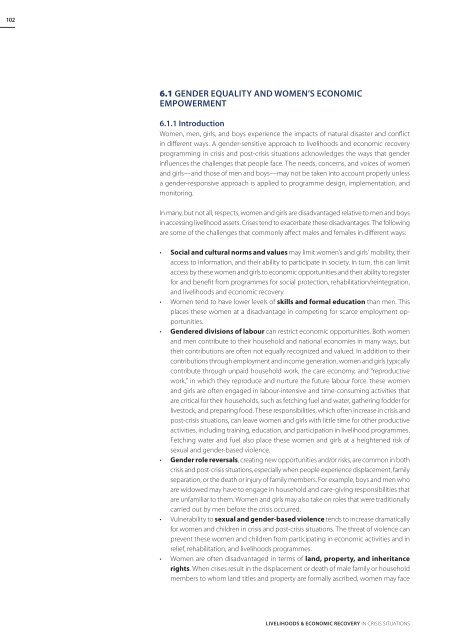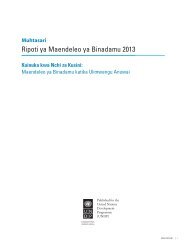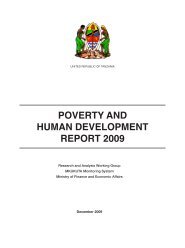Download PDF (4.08 MB) - ReliefWeb
Download PDF (4.08 MB) - ReliefWeb
Download PDF (4.08 MB) - ReliefWeb
You also want an ePaper? Increase the reach of your titles
YUMPU automatically turns print PDFs into web optimized ePapers that Google loves.
102<br />
6.1 Gender Equality and Women’s Economic<br />
Empowerment<br />
6.1.1 Introduction<br />
Women, men, girls, and boys experience the impacts of natural disaster and conflict<br />
in different ways. A gender-sensitive approach to livelihoods and economic recovery<br />
programming in crisis and post-crisis situations acknowledges the ways that gender<br />
influences the challenges that people face. The needs, concerns, and voices of women<br />
and girls—and those of men and boys—may not be taken into account properly unless<br />
a gender-responsive approach is applied to programme design, implementation, and<br />
monitoring.<br />
In many, but not all, respects, women and girls are disadvantaged relative to men and boys<br />
in accessing livelihood assets. Crises tend to exacerbate these disadvantages. The following<br />
are some of the challenges that commonly affect males and females in different ways:<br />
• Social and cultural norms and values may limit women’s and girls’ mobility, their<br />
access to information, and their ability to participate in society. In turn, this can limit<br />
access by these women and girls to economic opportunities and their ability to register<br />
for and benefit from programmes for social protection, rehabilitation/reintegration,<br />
and livelihoods and economic recovery.<br />
• Women tend to have lower levels of skills and formal education than men. This<br />
places these women at a disadvantage in competing for scarce employment opportunities.<br />
• Gendered divisions of labour can restrict economic opportunities. Both women<br />
and men contribute to their household and national economies in many ways, but<br />
their contributions are often not equally recognized and valued. In addition to their<br />
contributions through employment and income generation, women and girls typically<br />
contribute through unpaid household work, the care economy, and “reproductive<br />
work,” in which they reproduce and nurture the future labour force. these women<br />
and girls are often engaged in labour-intensive and time-consuming activities that<br />
are critical for their households, such as fetching fuel and water, gathering fodder for<br />
livestock, and preparing food. These responsibilities, which often increase in crisis and<br />
post-crisis situations, can leave women and girls with little time for other productive<br />
activities, including training, education, and participation in livelihood programmes.<br />
Fetching water and fuel also place these women and girls at a heightened risk of<br />
sexual and gender-based violence.<br />
• Gender role reversals, creating new opportunities and/or risks, are common in both<br />
crisis and post-crisis situations, especially when people experience displacement, family<br />
separation, or the death or injury of family members. For example, boys and men who<br />
are widowed may have to engage in household and care-giving responsibilities that<br />
are unfamiliar to them. Women and girls may also take on roles that were traditionally<br />
carried out by men before the crisis occurred.<br />
• Vulnerability to sexual and gender-based violence tends to increase dramatically<br />
for women and children in crisis and post-crisis situations. The threat of violence can<br />
prevent these women and children from participating in economic activities and in<br />
relief, rehabilitation, and livelihoods programmes.<br />
• Women are often disadvantaged in terms of land, property, and inheritance<br />
rights. When crises result in the displacement or death of male family or household<br />
members to whom land titles and property are formally ascribed, women may face<br />
Livelihoods & Economic Recovery in Crisis Situations





